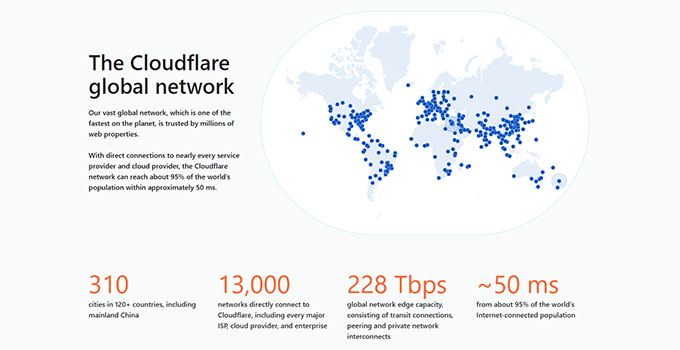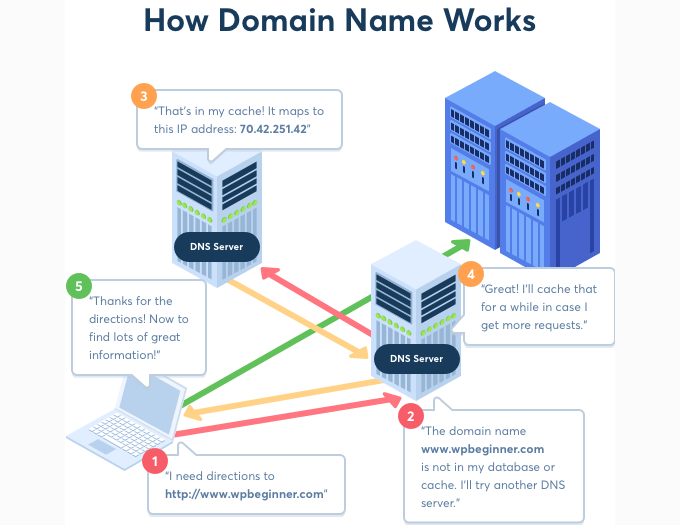At WPBeginner, we used to use Sucuri for a long time as our website firewall, security, and CDN solution. We recently switched to another firewall and CDN service, Cloudflare.
At WPBeginner, we are transparent about the technologies we use behind the scenes. We have consistently shared that expertise and knowledge with our users for the last 14 years.
In that tradition, we’ll share why we switched from Sucuri to Cloudflare and what performance and security gains we achieved.
Note: This article is part of our WPBeginner Insider series, where we introduce you to the products we use at WPBeginner. We publish WPBeginner Insider every other Thursday.

Background Story
Before we talk about the switch, let’s briefly talk about Sucuri and Cloudflare and what services they provide to website owners.
They are both website security and performance services and offer DNS-level website firewalls and CDN solutions.
What is a website firewall?
A website firewall acts as a security checkpoint between your website and its traffic. It detects and blocks malicious requests like attackers, bots, malware, hackers, and more.
Now, some firewalls work on the server level. However, they are less efficient because the malicious requests may have already reached your server by the time they are blocked.
Sucuri and Cloudflare are both DNS-level firewalls. They re-route your website traffic through their servers and block them before they reach your site.
What is CDN?
A CDN (Content Delivery Network) is a global network of computers spread around the world.
Normally, when a user visits your website, they send their request to your hosting server. It takes more time for users to see your website if they are in a different geographic location.
A CDN service solves this problem by sending static and cached data of your website to the user from a much closer server. This will make your website load faster for all your users.
About Sucuri and Cloudflare
At WPBeginner, we used to use Sucuri for a long time as our website firewall, security, and CDN solution.
It is one of the best WordPress security plugins and has helped us secure WPBeginner against Brute Force attacks.
Cloudflare is the industry leader in CDN and website security industry. Over the years, it has grown incredibly, and so has its technology stack, infrastructure, and expertise.
Recently, we moved from Sucuri to Cloudflare CDN, and here we’ll share the reasoning behind that decision.
Reasons Why We Switched from Sucuri to Cloudflare
At WPBeginner, we always recommend our users choose a solution that fits their needs.
We use the same principle in our business by investing in tools and services that fulfill our needs.
Over the last several years, WPBeginner’s needs outgrew Sucuri. Several reasons made us decide to finally switch over to Cloudflare.
Here, we’ll explain each one of them so that you can get a behind-the-scenes look at how we reached that decision.
1. Faster and Largest CDN Network
Cloudflare is one of the world’s largest CDN networks. With servers in 310 cities across 120+ countries, Cloudflare directly connects to over 13,000 networks, including every major ISP, cloud hosting provider, and enterprise service.

This means Cloudflare is the nearest server to users’ locations and often the fastest with the lowest latency.
In easier words, Cloudflare is like a fast lane to the internet.
At WPBeginner, our users are from all over the world. Switching to Cloudflare meant reduced latency, faster page loads, and great performance no matter where our users come from.
In comparison, Sucuri has a smaller CDN network with servers spread across strategic locations. It did help speed up website performance, but not as much as Cloudflare, which has more servers across the globe.
Being able to deliver our content to more people, faster, made Cloudflare the obvious choice.
2. Better Granular Firewall Rules
A website application firewall like Sucuri and Cloudflare automatically detects and blocks malicious attacks at the DNS level.
Larger websites are more frequently targeted by hackers with malicious intent.
Those attacks are sometimes more sophisticated than common DDoS / brute-force attacks.
Because of that, we needed more control over the firewall and attack-blocking rules to combat this.
We are now on the Cloudflare Enterprise plan and have ‘Layer-3 Network DDoS Protection.’ We have access to many pre-made rulesets like Cloudflare WordPress, CF PHP, and more at this level.
We now have extensive options and granular control over what firewall rules we use, which helps us protect and block even larger and more sophisticated attacks before they can reach our servers.
3. Centralized DNS Management
DNS (Domain Name System) is crucial for translating human-readable domain names into IP addresses that computers understand.
Normally, the web hosting company or domain registrar handles DNS management for websites.

If a website is hosted in New York, and a user types in the domain from Tokyo, the request will take longer to resolve due to the distance between the DNS servers.
It is a negligible performance sacrifice for smaller websites. However, slow DNS resolution is a noticeable performance issue for larger and more popular websites like WPBeginner.
Previously, we used Sucuri with Constellix to improve performance. Constellix is a DNS server company with servers across the globe to ensure faster resolution of DNS regardless of the user’s geographic location.
Switching to Cloudflare gave us centralized DNS control and the ability to control DNS permissions better.
It also gives us a performance bump due to Cloudflare’s larger DNS server network, routing rules, and short TTLs.
This means when someone types in WPBeginner.com in their browser, the DNS resolution takes place much quicker because the response is closer to their location.
4. Uptime Reliability
This is a pretty major reason that we switched from Sucuri to Cloudflare. We noticed that occasionally, Sucuri would have regional outages, especially in Europe.
This would require our DevOps team to route European traffic away from Sucuri and direct it to our servers, which isn’t ideal from either a security or performance standpoint.
Imagine an outage occurring simultaneously when our website is under a DDoS attack. This could potentially degrade our website performance for users in other regions as well.
Cloudflare is more reliable in this regard.
They have a larger network, more data centers, and regional connectivity, all of which add more redundancy to their infrastructure, ensuring uptime.
This uptime reliability is crucial for performance and a big relief for our DevOps team.
5. Better DNS Analytics
Monitoring our website traffic using Google Analytics helps us make data-driven decisions about our business.
However, this data does not include information about DNS requests and their resolutions because website analytics tracking begins after the DNS resolution.
Access to DNS analytics helps us understand DNS requests and queries to our DNS servers. We can also see which requests were blocked, where they originated, and more.
Sucuri simply didn’t provide much of this information. Cloudflare has a handy DNS Analytics dashboard. They also offer an API to the Enterprise users to fetch data from their DNS logs.
Like the granular control of rules, being able to pull DNS logs and monitor requests and queries helps provide the best service we can to WPBeginner users.
Sucuri vs. Cloudflare – Which Do We Recommend?
Both Sucuri and Cloudflare are great solutions for the security and performance of a WordPress website. We would not have used Sucuri for as long as we did, if it weren’t a solid service.
You can take a look at our detailed comparison of Sucuri vs. Cloudflare for more information.
Which one do we recommend? It depends on your business needs and requirements.
For instance, if you are starting a blog or small business website, Cloudflare free CDN would be a great starting point.
It gives you access to basic website security and CDN network. Even at the free level, this improves your website performance and security.
On the other hand, if you can spend a little or have a limited budget, we will recommend the Sucuri website firewall. They are cheaper than Cloudflare’s more expensive plans and still offer a robust security solution to WordPress users.
Lastly, if your business can support it, we recommend upgrading to a Cloudflare Business or Enterprise plan. It will give your website a significant performance boost with enterprise-grade security and reliability.
We hope this article helped you learn the process behind our decision to switch to Cloudflare. You may also want to see our WPBeginner Insider case study of why we switched from Mailchimp to Drip for email marketing.
If you liked this article, then please subscribe to our YouTube Channel for WordPress video tutorials. You can also find us on Twitter and Facebook.





Syed Balkhi says
Hey WPBeginner readers,
Did you know you can win exciting prizes by commenting on WPBeginner?
Every month, our top blog commenters will win HUGE rewards, including premium WordPress plugin licenses and cash prizes.
You can get more details about the contest from here.
Start sharing your thoughts below to stand a chance to win!
Jiří Vaněk says
Thank you for the detailed examples of why ClodFlare is good and why you switched to it. I use CF for all my domains and I’m glad I could confirm that it was a good choice. I am also satisfied with CF, even if some things are still missing (eg hotlinking protection for webp images).
Francis Opiyo says
Hey WPbeginner,
I have been following your blog for some time now. I do agree that cloudflare one of the best website firewall and CDN services there. I have been using Cloudflare for my website for a year it is good
WPBeginner Support says
Glad to hear you’ve enjoyed using it
Admin
Vincent Nyagaka says
Thank you for this insightful comparison between Sucuri and Cloudflare! As a website owner, choosing the right security and performance solution is crucial, and your detailed analysis of why you switched from Sucuri to Cloudflare is incredibly helpful.
In my experience, I’ve found that Sucuri excels in providing robust website security features, especially with its emphasis on malware detection and removal. However, Cloudflare’s widespread CDN network and performance optimization tools make it a compelling choice for improving website speed and reliability.
Ultimately, the decision between Sucuri and Cloudflare depends on the specific needs of each website owner. Factors such as budget, technical expertise, and the level of security required all play a significant role in making the right choice.
Thanks again for shedding light on this important decision for website owners!